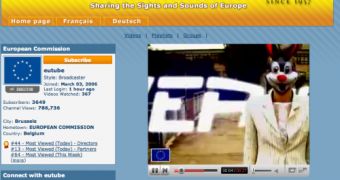The European Union announced that it cooks a new set of rules for broadcasting and on-demand content, a category that also includes Google Video and the popular online video sharing service YouTube, also owned by the Mountain View company. According to Patricia Moll, European Policy Manager, the EU split the content in two parts: television ("linear") and television-like on-demand content ("non-linear"). Obviously, the video services provided by the Mountain View company are included in the second category as they display only the content selected by the users from a huge database of vids.
All the new rules are especially meant to protect the users as they are able to block illegal content from being delivered to the consumers. Also, the sexual orientation, the racism, the nationality and the disability insulting videos will be better filtered. However, Google's products were already fighting against these types of content even if the search giant encountered problems with copyright infringement clips.
"The new directive also includes an important reference to the "country of origin principle," which simply means that content will continue to be regulated by the rules of the country from which it originates. Each country within the European Union will have broadly similar rules but there may be subtle differences. Anyone supplying content to users would only have to worry about one set of rules, rather than differing laws across the EU's Member States," the Google representative mentioned.
Recently, the popular YouTube rolled out a new YouTube channel that provides one-click access to the latest videos powered by the European Union. This is probably the best proof that Google supports the EU's efforts to improve the protection of the online content and avoid displaying illegal material to the consumers. However, the product acquired by Google in October 2006 for $1.65 billion caused several problems for the search giant as it was the main subject for the copyright infringement complaints filed by a lot of firms.

 14 DAY TRIAL //
14 DAY TRIAL //